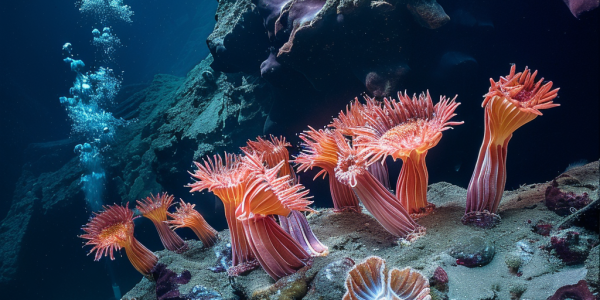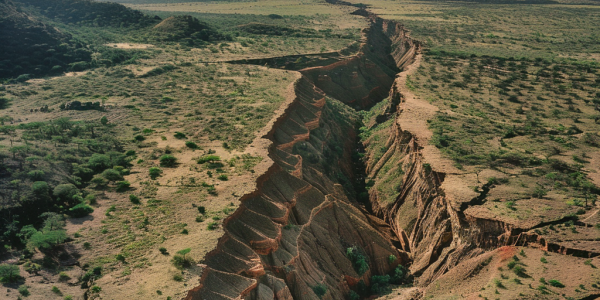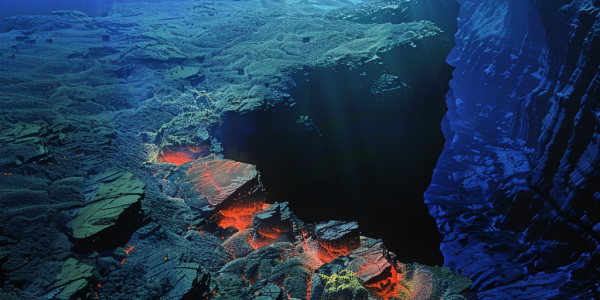Scientists Discover New Ecosystem in Earth’s Oceanic Crust
Scientists from the Schmidt Ocean Institute have discovered a new ecosystem in the Earth’s oceanic crust, revealing giant tubeworms and unique marine life thriving in extreme conditions. This groundbreaking research challenges previous understandings of marine biodiversity and highlights the importance of ocean exploration and conservation.
Exploring the Resilience of Tubeworms in Deep-Sea Ecosystems
Discover the fascinating world of tubeworms, extraordinary invertebrates thriving in extreme deep-sea environments near hydrothermal vents and cold seeps. Learn about their unique adaptations, symbiotic relationships with chemosynthetic bacteria, and the critical research efforts by the Bureau of Ocean Energy Management (BOEM) aimed at protecting these vital ecosystems from the impacts of climate change and human activity.
Rainfall Enhances Ocean’s Carbon Absorption by Up to 7%
A groundbreaking study reveals that rainfall significantly enhances the ocean’s ability to absorb carbon dioxide (CO2) by 5% to 7%, equating to an additional 140–190 million metric tons annually. Led by oceanographer David Ho, this research emphasizes the critical role of precipitation in the ocean’s carbon sink capacity and calls for a reevaluation of climate models to include rainfall effects on CO2 absorption.
Scientists Embark on Deep-Sea Expedition to Uncover Marine Biodiversity
Scientists from the Senckenberg Research Institute embark on a groundbreaking expedition aboard the research vessel ‘Meteor’ to explore the depths of the Atlantic Ocean. This mission aims to uncover new marine species and enhance our understanding of biodiversity, crucial for addressing environmental challenges and climate change. With a focus on the role of biodiversity in Earth’s systems, the Senckenberg Society continues its commitment to scientific inquiry and conservation efforts.
Africa’s Gradual Split: A Geological Marvel Unfolding Over Millions of Years
Africa is slowly splitting apart due to the East African Rift System, a geological process that will take millions of years to unfold. This fascinating rifting phenomenon, while not an immediate threat, has significant implications for the continent’s future landscape. As tectonic plates move, scientists study these changes to understand Earth’s dynamic nature and long-term geological evolution.
Ancient Seafloor Slab Discovered Beneath Pacific Ocean Sheds Light on Earth’s Mantle
A groundbreaking geological discovery in the Pacific Ocean reveals an ancient slab of seafloor, dating back over 120 million years, that has been sinking into the Earth’s mantle. This finding enhances our understanding of geological processes and the enigmatic behavior of the Earth’s mantle, shedding light on the interactions between tectonic plates and large low-shear-velocity provinces (LLSVPs). Researchers highlight the significance of this ancient slab in unraveling the mysteries of Earth’s geological history.
WHOI Scientists Unveil Fast-Degrading Bioplastic as Solution to Ocean Pollution
Scientists at WHOI have unveiled a revolutionary bioplastic, cellulose diacetate (CDA), that degrades 15 times faster in seawater than traditional plastics like Styrofoam. This sustainable material, developed to combat marine pollution, shows promising results, losing up to 70% of its mass in just 36 weeks. The study highlights the urgent need for biodegradable alternatives to reduce plastic waste and protect marine ecosystems.
Discovery of Vast Water Reservoir Deep Within Earth’s Mantle
A groundbreaking study reveals a vast reservoir of water deep within the Earth, potentially three times the volume of all oceans combined. Researchers discovered ringwoodite, a unique rock in the transition zone that can trap significant amounts of water, shedding light on the Earth’s water cycle and geological processes. This discovery could reshape our understanding of the origins of Earth’s water and its distribution throughout history.
Plankton’s Future at Risk Amid Climate Change
Plankton, essential for marine life and the oceanic food web, are facing significant changes due to climate change. Rising global temperatures and ocean acidity threaten their survival, impacting fish populations and global food security. Research highlights the need for deeper understanding and conservation efforts to protect these vital organisms and maintain ecological balance.
Scientists Discover Vast Water Reservoir Deep Within Earth’s Mantle
Scientists from Northwestern University have discovered a vast reservoir of water, potentially a sixth ocean, located 700 kilometers beneath the Earth’s surface within ringwoodite. This groundbreaking finding could redefine our understanding of the planet’s water cycle and geological processes, suggesting that Earth’s oceans may have originated from its interior rather than external sources. The implications of this discovery are profound, impacting our understanding of tectonic activity and the evolution of the planet’s hydrosphere.










